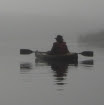Two days ago I returned home from a journey to
Yet what stands out in my mind is not so much the facts presented in the workshops, as the impressions I felt between the words.
The concert the first evening was impressive: powerful, flexible, expressive singing with skillful piano accompaniment. Yet I was oddly unmoved, even critical. Why? Perhaps the singer was just too young, too obviously happy and well dressed, to be singing these wistful wanderer songs. What does it take for music to be convincing? Is there any hope of delivering service music with conviction, when the mind is usually scrambling between the current tempo struggle and the worry of "what comes next"?
During the organ movie, I was astonished to find myself moved to tears. Partly just weariness, I supposed. Yet I sensed, even from sound and images tightly circumscribed by television projection, how the grandeur of organ and chorus could support the soaring of the soul.
At Jeff Hanlon's guitar concert, I found myself restless. My wandering thoughts frustrated me. Why couldn't I focus on this intriguing music? It crossed my mind that I wanted to move, to be outdoors. Not to leave the music, but to hear it in a different place, and to move. Yet I was frozen, hardly remembering to breathe, with only my thoughts stirring in restless betrayal.
The music that we explored at the anthem reading sessions was distinctly in three flavours. No, more like two flavours, and one completely different food. There were traditional anthems, and there were contemporary anthems. Then there was song: music for all to join. At the time, I noticed the contrast in emphasis. Now, I notice a paradox. I was more comfortable singing along in the songs than carefully following my part in the anthems. In the anthems, it was harder to feel a stirring of the spirit, with my mind so active. Yet for someone who is even less comfortable singing, would it be distracting to try to sing along in a song, rather than to listen to an anthem from a choir?
At morning chapel, I noticed the prelude. It took three times, but I noticed. I noticed its separateness, the silence bracketing it. It was not just sound filling time. It was an announcement, a calling together.
Back home, I suggested to our minister that instead of playing the organ continuously from
At Wesley Warren's organ concert, I was at first bewildered by the seating arrangement. Our backs to him! I contemplated joining those who sat in the chairs near the front of the chapel, swiveling their chairs to face the loft at the rear. Yet as the recital proceeded, I sensed the wisdom of the arrangement: the music from an unseen source, behind, is offered together with the forward gaze of the congregation, flowing together in a single act of worship. Somehow musicians, music, and gathered people are all part of one procession approaching God.
Someone commented, "All those layers, and you can hear them all!" Is my hearing faulty, or just untrained? At times I heard only a wall of sound. Yet I was delighted by the conclusion of the Bach, where one by one the voices resolved out of a dense jungle until there was only a pure, transparent, yet magnificent chord.
The journey home from
As
Somewhere in my travels I had commented to someone about my habit of driving at 90 or even 80 kilometers per hour on
And so my thoughts came around again to the lure of power, whether it be the controls of a car, or the console of an organ, or the podium before a choir. How easy it is to cross the line between employing power in service, and exploiting power in personal gratification.
"For the beauty of the earth." Two lines from that hymn haunted me earlier this summer. I searched my mind fruitlessly for the rest of it, or for the first line, to look it up. Finally I found it, and discovered that in Voices United, those haunting lines have been changed. The most significant word is gone. "Lord of all, to thee we raise/this our sacrifice of praise." Apparently, the word sacrifice connected the hymn to communion, so it was taken out to make the hymn more general. Yet I had never heard it as a reference to communion. I heard it as an unusual insight: in any act of organized praise, we make a sacrifice. We sacrifice resources through our travel to gather; through the heating and lighting of our worship space; through the electricity powering the organ; through the past use of energy to produce the materials of the building and the organ and the hymnals ("embodied energy"). The larger the building, or the more magnificent the organ, or the more rehearsed the choir, or the longer the journey of the worshippers, the larger the sacrifice.
The guitar seems so quiet and humble. No electricity required.
My husband would remind me about the embodied energy in those strings I keep replacing.





2 comments:
I sure like your ideas about music. Too often churches slap it around like putty, just something to fill in the gaps, rather than the native tongue of the angels.
Well, the reality in churches may involve so much compromise that the angels become very difficult to hear, and yet... For those Sundays when I am the accompanist, I choose hymns carefully to fit the themes, position in the service, etc. When another is playing, I choose more according to the player's ability. Sometimes I feel I am just filling the gaps with familiar old hymns, and those are the days that I get appreciative comments about the music. What I hear as a tired old recitation may raise the angel chorus in another's heart.
Post a Comment